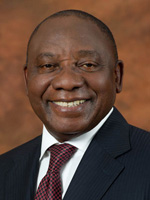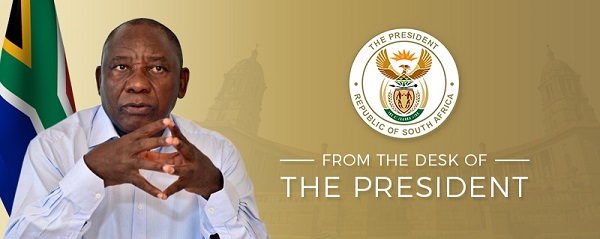 Dear Fellow South African,
Dear Fellow South African,
We have just returned from the United Nations Climate Change Conference in Dubai, known as COP28, where important decisions taken so far will affect the future of our planet.
The discussions at COP28 have significant implications for our country and people. The impact of climate change is a measurable reality in South Africa, with poor, rural communities in particular bearing the brunt.
While in Dubai, I visited the South Africa pavilion, where I was shown a striking artwork called the Umlibo tapestry. It was made by a group of rural women from Hamburg in the Eastern Cape. Woven in the tapestry are images that tell a story of the impact of climate change on rural coastal communities in the province struggling with extreme weather patterns, declining fish stocks and constrained livelihoods.
The Umlibo tapestry communicates the urgent and personal impact of climate change on one particular community. There are hundreds, thousands and millions more communities, in South Africa, on the African continent and across the Global South who are being negatively affected by climate-change induced extreme weather.
A central part of South Africa’s response to this crisis is the Just Energy Transition (JET) Investment Plan 2023-2027, which outlines the actions we need to take and the investments that we need to make to meet our climate targets.
The plan, which we announced at COP27 last year, outlines the path towards reducing the carbon emissions of our energy sector, which is the largest contributor towards South Africa’s total greenhouse gas emissions.
The plan focuses on investment in electricity infrastructure, new energy vehicles, green hydrogen, skills development and municipal electricity distribution.
It emphasises that this transition must be underpinned by engagement and in partnership with workers, communities, business and civil society. Importantly, the plan also includes interventions to support affected communities, notably in Mpumalanga, where most of our country’s coal-fired power stations are located.
The overriding message we took to COP28 is that our climate commitments will be implemented in a manner that both addresses our current energy crisis and strengthens our efforts to reduce poverty and unemployment.
Our JET Implementation Plan therefore focuses on expanding investment in transmission networks, investment in new energy vehicles and harnessing the potential of the green hydrogen economy.
Decarbonising our energy sector has become even more urgent in the face of carbon border taxes and other measures being taken by developed economies in the name of fighting climate change. These measures are going to hurt many countries with developing economies, making their exports less competitive and making them bear the economic burden of climate action. It is for these reasons that the South African delegation to COP28 spoke out against these unilateral actions.
As a country, we already have sustainable, measurable and science-driven programmes in place to adapt to and mitigate the effects of climate change. These include a successful renewable energy procurement programme, biodiversity and conservation management, air quality management, as well as successful natural resource management programmes such as Working on Fire, Working for the Coast and Working for Water.
But if we are to implement these and the other actions outlined in the JET Investment Plan we – like all other developing economies – will require massive financial support from those countries whose development has been the primary cause of climate change. The countries that have contributed most to global warming must support those countries that now bear the brunt of its effects.
South Africa expressed its concern that developed economies are still not meeting their obligations to support developing countries with the finance, technology and capacity building needed for effective climate actions. The funding that has been channelled through entities like the Green Climate Fund and Adaptation Fund has been negligible.
The operationalisation at COP28 of a fund to help vulnerable countries with loss and damage caused by climate change is a step in the right direction, but it will need substantial funding if it is to fulfil its purpose.
For the transition to lower carbon economies to be just, affected communities cannot live on promises. Workers and communities currently dependent on coal and other fossil fuel industries need viable alternative livelihoods.
As a country in the midst of an energy crisis, we were clear at COP28 that the pace of our just energy transition will be guided by our developmental priorities. Our JET Implementation Plan makes it clear that we can take effective action against climate change while pursuing energy security for all our people.
Even as we confront several challenges, we are clear about the path we must take to tackle climate change and protect our country from its effects.
In pursuing a measured, realistic and sustainable transition towards a low-carbon economy and society, our foremost priority is that we secure the future of all South Africans and that we leave no-one behind.
With best regards,





